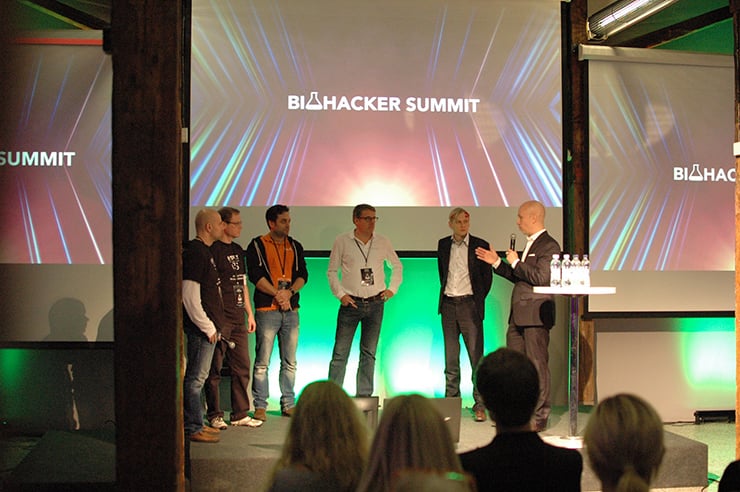I recall laughing, years ago, after seeing a bumper sticker that read, “You Exercise. You Eat Healthy. You Die Anyway.” This lighthearted, yet obvious dig at overly “health conscious” people—who sometimes appear to think their mortality is entirely within their control—is amusing because it is true. We all will die anyway. Of course, there is nothing wrong with eating healthy, exercising, or generally attending to one’s well-being—both physical and mental. Indeed, it is a good thing. But what happens when living a life devoted to one’s own wellbeing becomes an obsession?
The term “biohacking” has been in the news a lot lately. It refers to a lifestyle dedicated to a process of becoming younger. Oftentimes, its practitioners make a difference between epigenetic and chronological age, epigenetic being the age that results from these supposed biohacking routines. Biohacker Bryan Johnson (who, at the chronological age of 46, spends $2 million per year on his routine) said that he “has the heart of a 37-year-old, the skin of a 28-year-old, and the lung capacity and fitness of an 18-year-old.” This may be true, but you don’t need a magnifying glass or to spend a lot of time gazing at him to realize that Johnson looks a bit like an alien android.
Similarly, a fellow biohacker, Dave Pascoe (who spends $30,000 per year on his routine) says that he is 61 years old but his epigenetic age is 38. He details his routine, which includes intense exercising and taking more than 150 supplements—82 in the morning, and 76 in the evening. Just thinking how much time it takes to ingest that many supplements makes me fatigued.
Another biohacker, Dave Asprey (who made millions of dollars at a Silicon Valley company) opened up his own company called Upgrade Labs that provides a biohacking service. “You come in,” says Asprey, “and we use medical-grade technology and AI to tell you what to do to get the results you want for longevity, or for cognitive enhancement …” Here, we witness the intersection of technology and a body-obsessed mind. “I work out 20 minutes a week, and I’m ripped,” says Asprey proudly. “And it’s because they have AI helping me not because I work hard.”
Clearly, there are many levels of this biohacking obsession. The term “biohacking,” signals something transient—even though, ostensibly, its primary mission is to extend life. Yet this isn’t new. Seeking a fountain of youth is as old as humanity itself. Most people don’t have the kind of money Johnson, Pascoe, or Asprey have to indulge in such pursuits. But there are plenty of people downstream of these billionaires who are obsessed with measurements, diets, exercise, and meditation.
The amount of diet books in bookstores is astounding, right next to “spiritual” self-help. They all claim to have an answer not just for a better life but for the perfect life, in which uncertainty is completely erased. But over time, we see that obsessive dietary and exercise routines can become just another occasion for disorder—a replacement of new bad habits for the old bad habits one previously indulged.
There is nothing wrong with order and routine. But when it begins to take away from the actual living of life, then one has entered the territory of complete alienation. This is just one of the issues with biohacking. It is an inward turn that leads us away from other people.
At the core of our lives are our encounters with others. Our lives have meaning when we are in relation to other people. These men seem to be missing that. What is strangely absent from the obsession with aging is the obvious neglect of one central question: Why do you want to extend your life to 110? This is the pinnacle and epitome of living an unexamined life. Not wanting to ingest toxins into our bodies is one thing, and refusing to do that is noble—a smart pursuit, even. But what about the toxins we allow into our minds, or even more, our souls?
Perhaps biohackers don’t really acknowledge the existence of a soul. Certainly, there is never any mention of faith or God. The only thing that is present in their conversation is a need for control and certainty. But what happens if a biohacker gets hit by a truck? Some things cannot be willed into existence because we are never in full control. It is a fantasy, a fairy tale we need to move beyond.
Given the rise of technology and the focus on “optimization” of computer systems, it is hardly a surprise that some would try to translate the notion of “optimization” into the health arena. But biohackers appear to be just bodies in a vat—creatures lacking soul, eros, and who, with every passing day, are becoming less and less human.
The search for youth, or for everlasting life is ultimately naïve. Time is passing, and there is nothing we can do about it. There is no such thing as certainty. Perhaps there is a better question that any biohacker ought to ask: How much time have I lost by attempting to become younger and live longer?

Leave a Reply